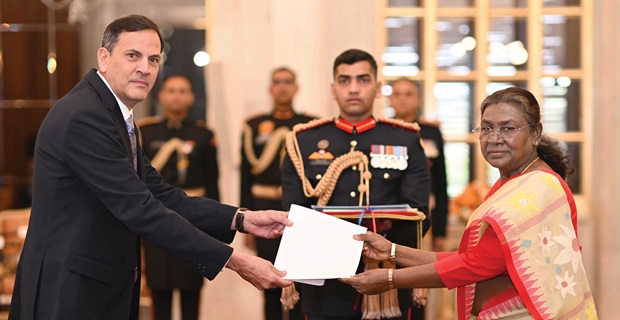India-Cuba Diplomacy Deepens
In this exclusive conversation with Bula Devi, Consulting Editor (International Affairs) India Empire Magazine,His Excellency Juan Carlos Marsán Aguilera, Ambassador of the Republic of Cuba to India, shares valuable insights into the enduring friendship and multifaceted cooperation between Cuba and India.
Ambassador Marsán Aguilera, a seasoned diplomat with deep experience in multilateral affairs, has previously served as Cuba’s Deputy Director General for Multilateral Affairs and International Law. His tenure in New Delhi has been marked by an active engagement in strengthening bilateral ties across sectors including healthcare, biotechnology, education, and trade.
India and Cuba share a longstanding and time-honoured relationship grounded in shared values of sovereignty, South-South cooperation, and non-alignment. From Che Guevara’s landmark visit to India in 1959, shortly after the Cuban Revolution, to recent high-level exchanges and collaborations in emerging sectors, the twonations have maintained a consistent dialogue rooted in mutual respect and solidarity. As both countries look to deepen economic and strategic engagement, Ambassador Marsán Aguilera offers a compelling perspectiveon the way forward in this evolving partnership in what was his very first interview after being appointed his country’s envoy in India.
India and Cuba go back a long way. India was among the first nations to extend recognition to the new Cuban government following the Cuban Revolution in January 1959. Can you take us through some of this historicity between the two nations?
Indeed, India was the first country in Asia to recognise the new Cuban government following the triumph of the Revolution in 1959. Just six months later, Commander Che Guevara visited India—his first stop in Asia and the first senior Cuban leader to do so. This visit, from June 30 to July 10, 1959, saw him travel to Delhi and Calcutta (now Kolkata), where he had memorable meetings with Prime Minister Jawaharlal Nehru. Their dialogue reflected the alignment of both nations in supporting anti-colonial and independence movements across the world.
Diplomatic relations between our countries were formally established on January 12, 1960, and this year we celebrate the 65th anniversary of those ties. One particularly symbolic episode occurred when Fidel Castro visited New York for the UN General Assembly and was denied accommodation at the official hotel. He chose instead to stay in Harlem, a move emblematic of solidarity with the underrepresented. Jawaharlal Nehru visited him there, and their three-hour conversation laid the foundation for a strong personal and diplomatic bond. Both leaders shared a vision for a more equitable world, championing self-determination and independence across Africa, Asia, and Latin America.
Fidel Castro returned to India twice—first in 1973, meeting Prime Minister Indira Gandhi en route from Algeria to Vietnam, and again in 1983 when he handed over the presidency of the Non-Aligned Movement (NAM) to India at a summit in Delhi. That iconic embrace between Fidel and Indira Gandhi remains a powerful symbol of our shared ideals and friendship.
In more recent years, President Ram Nath Kovind visited Cuba in 2018, meeting then-President Raúl Castro and travelling to Santiago de Cuba to pay homage at Fidel Castro’s final resting place. His visit epitomised the deep, enduring respect that transcends political parties and governments. Just last month, Deputy Prime Minister Dr Eduardo Martínez Díaz visited India during the Raisina Dialogue and the India Economic Conclave. A leading figure in Cuba’s biotechnology sector and a key contributor to our COVID-19 vaccine development, he held bilateral meetings with Prime Minister Narendra Modi and five other Indian ministers across sectors like foreign affairs, health, science, commerce, and AYUSH. These engagements underscored our shared commitment to elevate economic cooperation to match the strength of our political relations.











Comments.